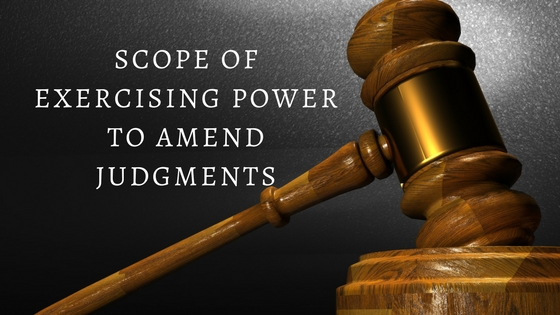Aapka Consultant Judgment Series- In this series, we are providing case analysis of Landmark Judgments of Hon’ble Supreme Court of India.
Dwaraka Das v. State Of Madhya Pradesh and Anr.
[1999] 3 SCC 500, AIR 1999 SC 1031
JUDGES: V.N. Khare and R.P. Sethi
Date of Decision: 10-02-1999
FACTS:-
An agreement was executed between the appellant and respondent-State for the construction of hostel. Later, respondent rescinded the contract alleging delay in progress of work. The appellant held the termination of contract in breach and thereof filed the suit for damages on breach of contract. The trial court decreed the suit in favour of the appellant with direction to pay interest @ 6% p.a. on damages. Further, moved an application under S. 152 of CPC for modifying decree so as to award interest pendente lite i.e. from the date of suit till the date of decree; was allowed by the trial court on the ground of accidental omission. Aggrieved by the decree, respondent filed the appeal and revision petition against the pendent lite award under S.152 of CPC before the High Court. The High Court partly allowed the appeal holding respondents liable to payments as ordered by the trial court. Further, High Court allowed the revision petition resulting in the set aside of interest pendent lite and appeal before the Supreme Court.
ISSUE:-
Whether judgement or decree passed by the trial court is under the scope of S. 152 of CPC?
JUDGMENT:-
There is a settled rule of law that once the judgment, decree or order is passed, court or the tribunal becomes functus officio and thus being not entitled to vary the terms of the judgments, decrees and orders earlier passed. It was S. 152 of CPC which provides for the correction of clerical mistakes in judgments, decrees or orders or errors arising accidentally or by omission but not merits of the case and so it was held in the present case. In the instant case, the omission in not granting the pendente lite interest could not be held as accidental omission or mistake. It was wrongly done by the trial court going beyond the scope of S.152 of CPC. If the omission or mistakes sought to be corrected are beyond the scope of S. 152 of CPC, then proper remedy will be to file an appeal or review petition. No Court can under the cover of the Ss. 151 or 152 can modify, alter or add to the terms of its original judgment, decree or order. In the present case, the trial court had specifically held the respondents-State liable to pay future interest only. Thus, the prayer of the appellant for grant of interest with effect from the date of alleged breach impliedly meant that the trial court had rejected the claim for the pendente lite interest.
On the above observations, the Supreme Court upheld the High Court’s decision in setting aside the trial court’s order for pendente lite interest. The appeal was allowed in part as to the appellant’s claims in judgment order of the trial order.
HELD:-
Thus, the omission sort to be modified merits of case so as to award pendent lite interest was beyond the scope and ambit of S. 152 of CPC.
To Get Legal Opinion from Advocates/ Legal Experts, Please click here
To Get Legal Opinion from Retired Hon’ble Judges, Please click here












